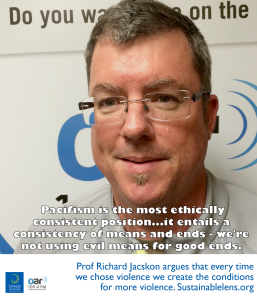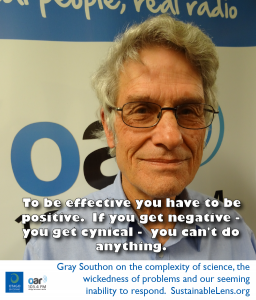Pacifism is the most ethically consistent position…it entails a consistency of means and ends – we’re not using evil means for good ends.
Prof Richard Jackson is Deputy Director at the National Centre for Peace and Conflict Studies (NCPACS) at the University of Otago. He has written several books on conflict and terrorism, mostly recently in the form of a novel Confessions of a Terrorist.
Talking points
I had a personal terrifying experience…a taste of the utter lawlessness of war, the arbitrary life and death decisions
Even though nothing happened to me, I was really just on the edges of the war, I realised how morally void war was – that’s one of the reasons why I became a pacifist.
A real impetus for me was to try to understand the causes of underdevelopment
My focus on how we deal with violent conflict, and how we can make the world a more peaceful place.
9/11 occurred, maybe a little bit before, I was starting to question whether we really understood the causes of war.
9/11 was a transforming moment…I started thinking about how we respond to terrorism.
9/11 was void of meaning so we saw the development of a language to describe it, it wasn’t a criminal act, it was terrorism and we quickly saw the response framed as a “war on terror”…it was televised…and it was on the back of years of increasingly racist sentiment…so the response was unlike anything we’ve experienced before…a whole new paradigm of irrational hatred.
The television coverage mirrored disaster films…so the interplay of real and virtual exploded.
This one was framed as “act of war”…and everyone repeated that around the world. The consequence of that, and maybe the intention, was to take terrorism out of the political or criminal frame and to put it in a military frame.
Partly this was a psychological response, because on that day the American military – the most powerful military in the world – proved itself incapable of protecting the American people. It was impotent. Now that impotence had to be banished, so the best way to do this was to say “well this is not just terrorism, and it’s not crime, not murder, this is an act of war”. And the only way to respond to an act of war is to launch a defensive war – to use our military, to deploy it to eradicate terrorism around the world. So a war on terrorism was declared. Then war became the primary frame, not just strategically but legally as well.
The military (response) has been the absolute disaster of it. Because you can’t deal with terrorism though a war response. Terrorism is a political problem and it can only have a political solution.
I’m trying to avoid giving the notion that 9/11 was a rupturing event, it was certainly rupturing, but a number of things had been occurring before that which fed into this moment, the rise of the risk society, the idea that there are these risks out there that are completely unpredictable, well terrorism seemed to prove that, so you have to have an extreme precautionary philosophy in order to try and deal with it. And that means redefining laws – putting people into prison for what they might do rather than what they have done.
This reinvigorated the military-industrial complex…the security sector is thriving in western economies. But it relies on a discourse of “unlimited terrorist threat and that the state has a duty to prevent that, so if we have to give up civil liberties and have surveillance – this is just the price of dealing with this immense uncertain risk that faces us”.
The population was so easily manipulated with a preexisting culture of fear, crime is going down but the fear of crime is going up, something to do with affluenza – we’ve reached a level of society where we’re affluent enough to be able to sit around and be able to worry about things…there are so many moral panics that sweep through society.
The terrorism scare has come at a moment in our society that we’re already in a state of fear.
The media plays a huge role in the drama of terrorism – they just go nuts, exaggerating and hyping up threats that if you look at them statistically are tiny
There’s been a failure of public intellectuals, media commentators, and courageous politicians to stand up and say “hold on a second, this is hysteria, we really don’t need to be this worried, we really don’t need to change our entire way of life for this kind of hyped up threat”.
I’m more of a pacifist than ever before.
Violence is an incredibly useless way of getting things done.
The harm that violence does vastly outweighs any good outcomes that it produces.
I’ve examined theories of ‘just war’ and they are completely ludicrous, they really don’t stand up to scrutiny.
For intellectual reasons, it seems to me that the most realistic, and the most credible, as well as the most ethically consistent position is pacifism. It doesn’t entail any division or bifurcation between the means and ends, instead it entails a consistency of means and ends – we’re not using evil means for good ends, it’s using good means for good ends.
Research is showing that non-violence is twice as successful as violence in achieving its goals, even against the most oppressive regimes.
But not only that, when you use non-violent means to over-throw a dictator, or resist an invader, or change laws – you are creating democratic societies and longer lasting peaceful societies.
The means and ends are intimately connected, and the way you construct your politics will affect the kind of politics you have.
Basic social theory, the way you practice things constitutes the thing you are trying to make. If you practice violent politics you are going to create a violent polity. So to me it makes more sense, and it is more ethical to use non-violence to create a peaceful society.
Every time we chose violence we create the condition for the next war.
We’re not doing nearly enough to educate for a peaceful society. Most of our cultural system and educational system is geared towards normalising war and militarism.
Our remembrance practices – how we remember war and commemorate war is mostly geared towards war is inevitable, necessary and that war can be good and heroic and that we ought to value the people who go and fight in wars, rather than remembering it as a tragic waste of life and sowing the seeds for subsequent wars. Instead of remembering it as “never again”…that narrative got transformed.
In all our cultural productions – TV and movies, they are all about very violent heroes, who we admire even though their violence is exactly the same as the bad guys, they do it for good reasons.
There are not many peaceful heroes out there. Partly it’s because it is hard to make peace sexy, viscerally admirable, exciting, something to aspire to.
But, we’re at a moment in history of war weariness, a growing suspicion of militarism and its connection to inequality, climate change, the bad structural things. There’s a growing global consciousness…
Violence is built into international system.
Now we have a broader war of insurgency – non state actors, part of a growing inequality.
Every time we use violence to deal with what is actually a political problem we actually create more violent resistance. It’s an endless cycle.
(Activist?) I do. As a scholar we have a responsibility not just to study the world but to try and change it. It’s not the biggest part of what I do but it is something I am trying to expand upon.
I don’t believe in remaining neutral – I don’t think it is possible. If you try to remain neutral you basically support the status quo, and that is a political act
.
(Motivation?) A desire for a more peaceful world and a desire that my contribution to the world is a positive one rather than a negative one on balance. I try to live my life in a way that does no harm but also positively challenges the evil structures that we’re facing and transform them.
(Challenge?) Create more of a voice for peace activists, and work to try and transform what is actually quite a violent society.
(Miracle?) The world’s leaders wake with a revelation about the futility of violence.
.


